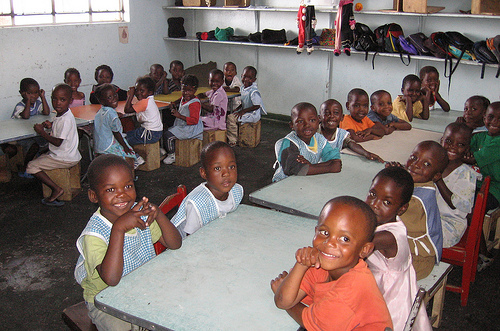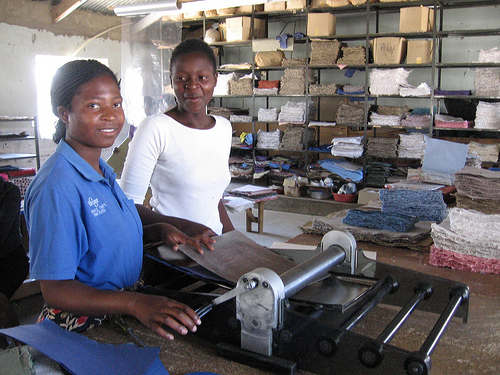Latest News
Eco Africa - creating crafting jobs for women in Zimbabwe.mov
Posted by Eco Africa Social Ventures
on
Sunday, May 23, 2010
, under |
comments (0)
Zimbabwe Faces Corn, Wheat Shortage After Dry Weather
Posted by flobugg
on
Wednesday, February 10, 2010
, under
Zimbabwe
|
comments (0)
Zimbabwe is facing corn and wheat shortages after a prolonged period of dry weather, the U.S. Department of Agriculture’s Foreign Agricultural Service said in a report.
The corn crop probably won’t exceed 600,000 metric tons, while the wheat crop won’t be more than 18,000 tons, the USDA said. Zimbabwe has an annual corn requirement of 1.2 million metric tons, according to the report.
While access to farming inputs in Zimbabwe has greatly improved after the implementation of subsidies, the country is “experiencing prolonged dry spells that are threatening corn production,” the USDA said. The number of Zimbabweans facing hunger will rise to 2.17 million in the first quarter of this year from 1.74 million in the previous three months, the U.S. Agency for International Development-funded Famine Early Warning Network said yesterday. Zimbabwe has depended on food aid from donor nations since 2001.
The country’s agriculture ministry and farmers’ organizations put the annual corn requirement at 1.8 million tons, including corn used in livestock feed. In addition to donor-funded aid to small-scale farmers, the Zimbabwe government provided $210 million in loans to both small and large-scale farmers to boost production, the USDA report said.
Corn and corn meal, the staple food, remain “generally available,” with corn grain prices averaging 28 U.S. cents a kilogram (2.2 pounds) since May 2009. “A number of factors such as the liberalization of grain trade, waiver of import duties on basic foods and the dollarization of the economy have contributed positively to food availability,” said the USDA.
Zimbabwe abandoned its own currency in February 2009, opting to use mainly the U.S. dollar and the South African rand. The move came after inflation reached more than a million percent and helped refill shop shelves after 10 years of shortages.
Source
Students Drop Out Because of Unaffordable Fees
Posted by flobugg
on
Wednesday, February 3, 2010
, under
Zimbabwe
|
comments (0)
Zimbabwe student leaders held a crisis meeting with Prime Minister Morgan Tsvangirai last week after it emerged that 28% of students had dropped out of the country's leading university because of a lack of foreign currency to settle tuition fees.
The University of Zimbabwe opened on Monday but students have been struggling to raise fees of between US$300 and $1,500 in a country where the highest paid civil servant earns less than US$200 per month and unemployment is pegged at 90%.
Zimbabwe abolished the use of the Zimbabwe dollar in February last year at the formation of an inclusive government between long-time ruler President Mugabe and Tsvangirai, who is the leader of the Movement for Democratic Change (MDC).
The United States dollar, South African Rand and Botswana Pula were declared legal tender. The adoption of the multi-currencies has been credited with reducing inflation from a world-record 231 million percent to just 7%. But it has caused major problems for students, who have struggled to find the required funds.
Some institutions of higher learning, such as Mutare Polytechnic College, have declined to release the examination results of students who failed to pay last year's tuition fees - a development that has affected an estimated 90% of its students.
The Zimbabwe National Students Union, Zinasu, confirmed last week that its leaders had held a crisis meeting with the Prime Minister and raised a number of issues.
Besides the problem of unaffordable fees, they discussed the continued victimisation of student leaders by the security forces, mechanisms and proposals to re-introduce the "learn now pay later scheme" to cater for underprivileged students, and the role of students in the constitution-making process.
Tsvangirai had "welcomed the issues raised and promised to look into the challenges even if it means sourcing international assistance," said Zinasu in a statement, adding that the union would "continuously follow-up on these issues to ensure that action is taken. The same issues will also been tabled with the Ministry of Higher Education in forthcoming meetings."
Zinasu also complained that the new semester had opened at the University of Zimbabwe with no students able to stay in campus residences due to lack of water and dilapidated infrastructure. Renovations are in progress. Last year the university was closed because of lack of water, prompting the United Nations Children Fund to drill boreholes.
Students have been forced to look for alternative accommodation off-campus, where many are living in squalid and grossly overcrowded conditions - as many as 56 in a house - posing health hazards, said the statement.
"The students cannot continue to be held at ransom and they have vowed to stage a massive demonstration until the halls of residence are opened," Zinasu added.
Unions for Zimbabwe State Workers Set Deadline for Action on Salaries
Posted by flobugg
on
Thursday, January 14, 2010
, under
Zimbabwe
|
comments (0)
Negotiations deadlocked this week following a government offer of pay increases from US$7 to U$21 a month, for a top salary of US$236 a month and entry-level compensation of US$150
Zimbabwe’s restive civil servants have given the three top figures in the unity government in Harare 14 days to increase public employee salaries or risk the enforcement of pay demands through labor actions. Economists warned that a strike could shake the cash-strapped government to its roots. President Robert Mugabe, Prime Minister Morgan Tsvangirai and Deputy Prime Minister Arthur Mutambara are on leave until February.
Negotiations deadlocked this week after the public service commission offered increases ranging from US$7 to U$21 a month. The highest-paid civil servant would earn US$236 a month, entry-level workers just US$150. State employees have demanded a total entry-level wage of US$630 a month – US$460 plus housing and transportation allowances.
The Public Service Association, the Zimbabwe Teachers Association and the Progressive Teachers Union of Zimbabwe in a news conference Wednesday called the state offer “ridiculous and out of sync with the cost of living.”
Eco Africa: 2009 Accomplishments
Posted by flobugg
on
Saturday, January 9, 2010
, under
EASV
|
comments (0)
This year has been a tough one financially, in Zimbabwe as always and here in New York for non profits including ours, (and many other individuals and companies, as we are all too aware).
In Zimbabwe sadly the great expectations for change with the coming of the new “Unity Government” are slowly fading as business-as-usual still seems to be the order of the day right now.
Food prices took a huge hike when the USD and SA Rand were declared the official currencies and the Zim dollar finally expired in a puff of smoke after the issue of the $1,000,000,000,000 bill. Only the top 15% in Zimbaweans have access to US dollars. Most ordinary people in the countryside are reduced to bartering; a chicken for a ride into town or worse; often their only currency of value women have are their bodies.
Eco Africa still struggles financially to stay operational but on the other hand has made great inroads in building our infrastructure with the help of a fantastic group of skilled volunteers.
We have this year
• Joined the online e-commerce community with our new Helping Hand for Africa Website
• Updated Eco Africa Social Ventures website
• Created an Eco Africa You Tube channel with our interview with Business Week and our Eco Africa Slide Show
• Created a new market for the artisans products through our new School Fundraising Program.
• Created a PR strategy and are just starting a media campaign to publicize the new Schools Fundraising Programs.
• We were invited by a number of prominent New York churches to set up tables of products for Fundraising Sales Events at gatherings they held.
• Will be shortly starting an Eco Africa Day Care Center project in Zimbabwe with the generous financial help of one of our friends and supporters.
• Received our first donation - from The US Embassy in Harare - to start building our new Crafting Center in Chitungwiza.
A big thanks to other wonderful friends who helped us out when we needed it most.








